Japan made them famous in the 1960s, South Korea has been marketing the concept for years and now Taiwan is designing some of the most luxurious love hotels in the business. In the last five-years, they have transformed their dated image of sleazy, windowless rooms into a multi-billion dollar industry.
"It is no longer necessary for lovers to resort to cheap or dirty rooms when they want to spend a few hours alone," said WeGo Taipei manager Henry Bai (
WeGo Motel (
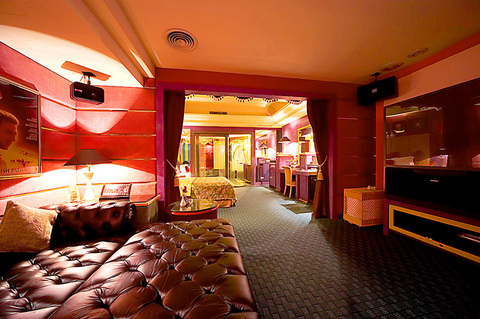
PHOTOS COURTESTY OF WEGO
"We don't want to convey a sex hotel image, so we don't put much sex equipment [paraphernalia] in the rooms. We are branding the love motel concept, with an emphasis on style and luxury," Bai said.
LOVE AND RIVALRY
Riding on the success of WeGo's hedonist paradise are a growing number of love villas in Taichung, and Kaohsiung, which boast larger, more extravagant rooms. One of the latest and most upscale additions to the market is Mulan Motel (
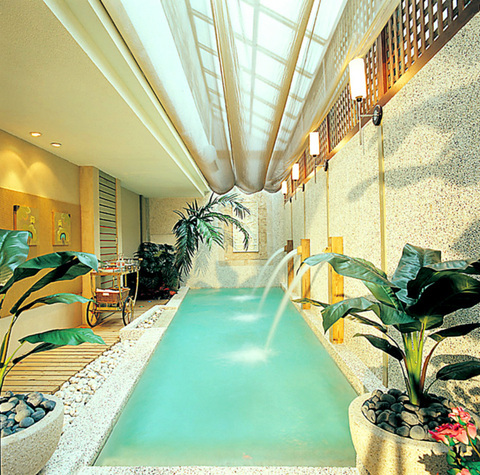
PHOTOS COURTESY OF IMORE
The high price of land in Taipei has kept WeGo's competitors to a minimum. On a similar sized plot of land, I MORE Motel (
Opened in December last year, I MORE's rooms are clearly bigger than those at WeGo, but use the same theme-style approach in their interior decoration. In addition to the queen-sized bedroom furniture is a variety of recreational equipment from big screen TV's (often more than one) and karaoke to rooms fitted with a private pool. Bathrooms are the main attraction, however, with a sauna, shower and party-sized hot tub in every room. The major difference between the two motels is I MORE's emphasis on sex with its sex-toy slot machines and selection of imported mechanical sex chairs. The motel also hired two actors to demonstrate 48 positions for an instructional program that plays on one of the many available adult channels.
Clients range in age from 25 to 50, but despite the queue of luxury sedans driving in, rooms are not always occupied by the wealthy.
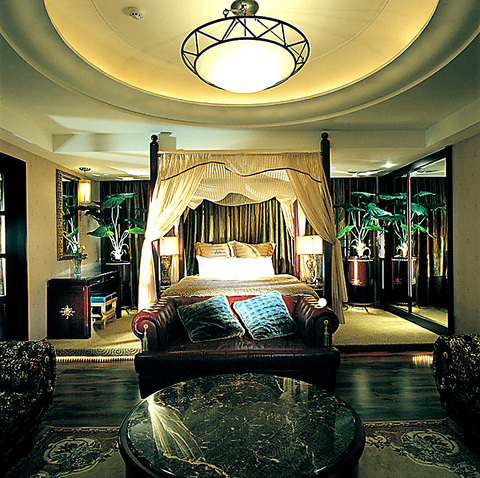
"Maybe they are not rich, but they will spend the money on a motel, because for a short time they can be treated and pretend like they are rich," said I MORE marketing manager Kyle Lai (
Wealthy or not, those dreams come with a hefty price tag.
A two hour "rest" at either motel can cost upward of NT$2,500, or NT$6,800 for 12 hours. For a large number of couples, however, it remains a small price to pay. An average day at WeGo Taipei sees 500 couples, which even at the least expensive rate of NT$1,500, translates as NT$750,000 per day. Weekends and rainy days draw an even larger turnover resulting in a queue of cars waiting three to four hours, Bai said. Both have overfill parking lots for patrons willing to wait it out.
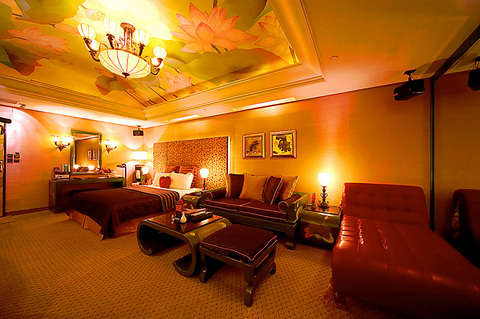
CLEANING UP
Once inside guests are treated with superior service. Both WeGo and I MORE have ISO 9001 certification, which assumes an international standard of quality in the hospitality industry. Cleaning procedures demand three housekeepers to clean one room, which is inspected prior to being rented out. Both motels claimed housekeepers spend 20 to 30 minutes per room. Bathrooms and bedrooms are also stocked with a wide selection of toiletries and confectioneries that compare, if not exceed in quantity, those found in a five-star hotel. Despite the comparable room prices and standards to fashionable business hotels, love motels are for couples only. No more and no less than two people are permitted in a room at one time, and no entrance is permitted to anyone below18 years of age.
Love motels, new and old, are viewed as models of discretion, according to Lai, who assures anonymity and said guests rarely see the staff.
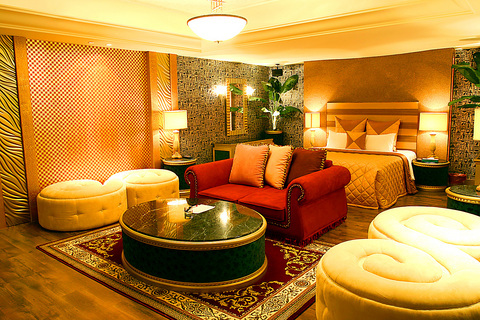
Normally, a receptionist sits in a booth at the entrance of the building greeting drivers and directing them to a room. A garage door automatically opens and closes once the car enters. Any room service is delivered to a special area outside the door, after which the wait staff leaves and notifies the guests by telephone that the food has arrived. I MORE has a separate hallway accessible only to the housekeeping "or guests in need of an escape route," Lai said.
WeGo doesn't have a secret passageway but it does have a pre-recorded soundtrack device that, with a a flick of the remote, will reproduce the background noise heard at a MRT station, beach or office when making a phone call.
Designed for love, the motels are setting hospitality standards. "Romance motels are designing some of the most luxurious, high-tech rooms in the country," Lai said.

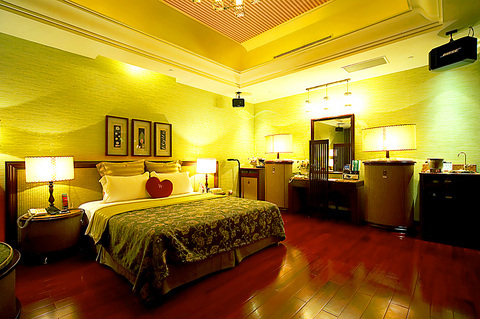

June 23 to June 29 After capturing the walled city of Hsinchu on June 22, 1895, the Japanese hoped to quickly push south and seize control of Taiwan’s entire west coast — but their advance was stalled for more than a month. Not only did local Hakka fighters continue to cause them headaches, resistance forces even attempted to retake the city three times. “We had planned to occupy Anping (Tainan) and Takao (Kaohsiung) as soon as possible, but ever since we took Hsinchu, nearby bandits proclaiming to be ‘righteous people’ (義民) have been destroying train tracks and electrical cables, and gathering in villages

Dr. Y. Tony Yang, Associate Dean of Health Policy and Population Science at George Washington University, argued last week in a piece for the Taipei Times about former president Ma Ying-jeou (馬英九) leading a student delegation to the People’s Republic of China (PRC) that, “The real question is not whether Ma’s visit helps or hurts Taiwan — it is why Taiwan lacks a sophisticated, multi-track approach to one of the most complex geopolitical relationships in the world” (“Ma’s Visit, DPP’s Blind Spot,” June 18, page 8). Yang contends that the Democratic Progressive Party (DPP) has a blind spot: “By treating any

Swooping low over the banks of a Nile River tributary, an aid flight run by retired American military officers released a stream of food-stuffed sacks over a town emptied by fighting in South Sudan, a country wracked by conflict. Last week’s air drop was the latest in a controversial development — private contracting firms led by former US intelligence officers and military veterans delivering aid to some of the world’s deadliest conflict zones, in operations organized with governments that are combatants in the conflicts. The moves are roiling the global aid community, which warns of a more militarized, politicized and profit-seeking trend

This year will go down in the history books. Taiwan faces enormous turmoil and uncertainty in the coming months. Which political parties are in a good position to handle big changes? All of the main parties are beset with challenges. Taking stock, this column examined the Taiwan People’s Party (TPP) (“Huang Kuo-chang’s choking the life out of the TPP,” May 28, page 12), the Democratic Progressive Party (DPP) (“Challenges amid choppy waters for the DPP,” June 14, page 12) and the Chinese Nationalist Party (KMT) (“KMT struggles to seize opportunities as ‘interesting times’ loom,” June 20, page 11). Times like these can